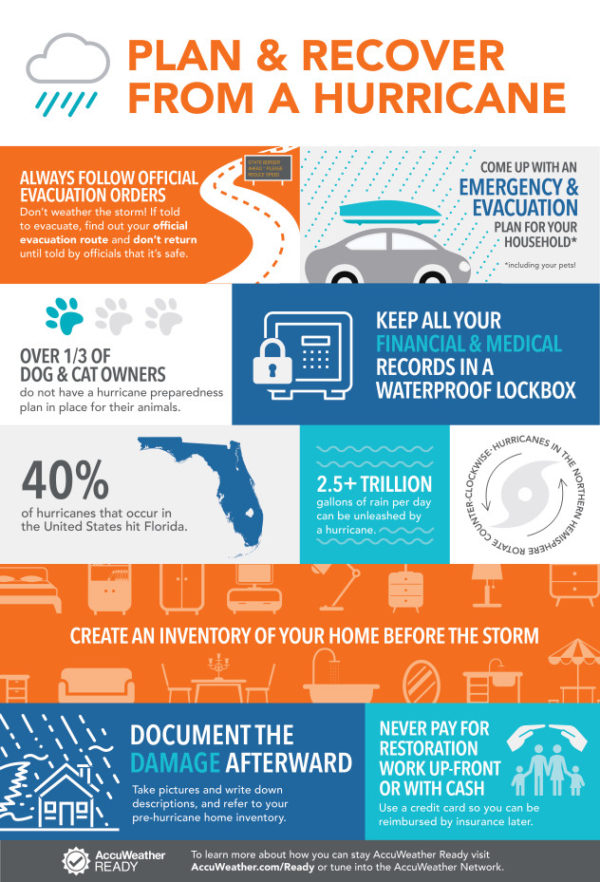
Hurricanes are dangerous and can cause major damage because of storm surge, wind damage, and flooding. They can happen along any U.S. coast or in any territory in the Atlantic or Pacific oceans. Storm surge is historically the leading cause of hurricane-related deaths in the United States.
Prepare for Hurricanes
Know your Hurricane Risk
Hurricanes are not just a coastal problem. Find out how rain, wind, water could happen where you live so you can start preparing now.
Make an Emergency Plan
Make sure everyone in your household knows and understands your hurricane plan. Discuss the latest Centers for Disease Control (CDC) guidance on Coronavirus (COVID-19) and how it may affect your hurricane planning. Don’t forget a plan for the office, kids’ daycare, and anywhere you frequent.COVID-19
Gather Supplies
Have enough supplies for your household, include medication, disinfectant supplies, cloth face coverings, pet supplies in your go bag or car trunk.COVID-19
Those with Disabilities
If you or anyone in your household is an individual with a disability identify if you may need additional help during an emergency.
Know your Evacuation Zone
You may have to evacuate quickly due to a hurricane. Learn your evacuation routes, practice with household, pets, and identify where you will stay.
Recognize Warnings and Alerts
Have several ways to receive alerts.Download the FEMA app and receive real-time alertsfrom the National Weather Service for up to five locations nationwide. Sign up for community alerts in your area and be aware of the Emergency Alert System (EAS) and Wireless Emergency Alert (WEA)- which requires no-sign up.
Review Important Documents
Make sure your insurance policies and personal documents like ID are up to date. Make copies and keep them in a secure password protected digital space.
Strengthen your Home
Declutter drains and gutters, bring in outside furniture, consider hurricane shutters.
Get Tech Ready
Keep your cell phone charged when you know a hurricane is in the forecast and purchase backup charging devices to power electronics.
Help your Neighborhood
Check with neighbors, senior adults, or those who may need additional help securing hurricane plans to see how you can be of assistance to others
Prepare your Business
Make sure your business has a continuity plan to continue operating when disaster strikes.
Returning Home After a Hurricane
- Listen to local officials for information and special instructions.
- Be careful during clean-up. Wear protective clothing and work with someone else.
- Do not touch electrical equipment if it is wet or if you are standing in water. If it is safe to do so, turn off electricity at the main breaker or fuse box to prevent electric shock.
- Avoid wading in flood water, which can contain dangerous debris. Underground or downed power lines can also electrically charge the water.
- Save phone calls for emergencies. Phone systems are often down or busy after a disaster. Use text messages or social media to communicate with family and friends.
- Document any property damage with photographs. Contact your insurance company for assistance.
Videos
- Ready Campaign Public Service Announcement’s-COVID-19
- Storm Surge Public Service Announcements (FEMA) (Video)
- FEMA Accessible:Hurricane Safety Messages (FEMA) (Video)
- Important Things to Know Before a Disaster(FEMA) (Video)
- When the Waves Swell – Hurricane Animated (FEMA) (Video)
Graphics
Tip Sheets
More Information
- National Weather Service 2020 Hurricane Preparedness Week (NWS) (Link)
- Coronavirus (Federal Government Response) (Link)
- Ad Council Coronavirus Response Toolkit (Link)
- Flood Map Service Center (FEMA) (Link)
- Floodsmart.gov (FEMA) (Link)
- National Flood Insurance Program (FEMA) (Link)
- National Storm Surge Hazard Maps (NOAA) (Link)






